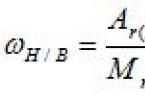I left my home
Rus' left the blue one.
Three-star birch forest above the pond
The old mother feels sadness.
Golden frog moon
Spread out on the calm water.
Like apple blossom, gray hair
There was a spill in my father's beard.
I won't be back soon, not soon!
The blizzard will sing and ring for a long time.
Guards blue Rus'
Old maple on one leg.
And I know there is joy in it
To those who kiss the leaves of the rain,
Because that old maple
The head looks like me.
Effective preparation for the Unified State Exam (all subjects) - start preparing
Updated: 2011-05-09
LookAttention!
Thank you for your attention.
If you notice an error or typo, highlight the text and click Ctrl+Enter.
By doing so, you will provide invaluable benefit to the project and other readers.
Historical and biographical material
History of creation and date of writing of the poem
In 1918, Yesenin moved from Petrograd to Moscow. His collections are published there.
The place of the poem in the poet’s work
The theme of Russia is the main one in Yesenin’s work. The feeling of love for the homeland, admiration for the beauty of the unassuming, but dear to the poet’s heart, Central Russian landscape is the main motive of the early lyrics.
The main theme of the poem
Homeland theme
The problem of the poem
Loneliness, blood attachment to one’s small homeland.
Poem composition
As is typical in Yesenin’s work, personal experiences are clothed in images of nature. We see this pattern in every stanza.
Lyrical hero
The lyrical hero is devoted to his small homeland. He has strong and deep feelings for this place. He left him a long time ago and now does not know when he will return again, which greatly depresses his spirit.
Prevailing mood and its changes
The psychological landscape conveys such moods as light sadness, joy, peace, admiration for beauty. Longing for abandoned house, interrupted family ties. Further, the mood is more anxious and restless, imbued with a feeling of loneliness.
Philosophical lyrics
4 stanzas. Quatrains
Basic images
Man and nature are fused together.
"Blue Rus'". The blue color enhances the feeling of vastness of space. Also, Yesenin’s blue is a symbol of divinity and holiness.
Maple is the keeper of the hearth. The poet also compares the maple with himself, emphasizing his loneliness.
Vocabulary of the poem
The words used were coined by the poet himself - “warms”, “apple tree”.
Visual means of allegory
color epithet “blue Rus'”, metaphor “the moon is like a golden frog”, comparison “like an apple blossom”.
Inversion. The exclamation enhances the conveyance of the hero’s experiences.
Sound recording
Assonance with "o" and "u".
Three-punch cutter. The foot is multisyllabic with stress on different syllables.
Rhythm and rhyme. Methods of rhyming
1st – 3rd stanza – cross.
4th stanza – there is no rhyme.
Sergei Yesenin is an extraordinary lover of creativity. This is a man who writes amazingly beautiful poetry, romantic and sometimes sad. IN this moment, This poem also relates a little to the sad tone of the works. It was not for nothing that Yesenin gave the poem such a name. In 1918, Yesenin wrote the poem “I Left My Home.”
This verse was written with all the poet’s soul. His thoughts and feelings resulted in a sweet-sounding verse, which amazes with its genuine sadness and sincerity in its sadness. Yesenin writes this verse after he saw his house. This happened after he lived for a long time in the city, which was the capital. Yesenin went there only because he began studying at the university. Also, due to his work in the printing press of various literature, he had no time at all for personal space, or even to see his family.
All this time, or to be more precise - several long years, which seemed like an eternity to him, he simply could barely stand the separation from his home and family. He also just wanted to see his native place - where he was born and raised. Where his youth and the stage of growing up passed. But Yesenin was disappointed, because after a long separation of several years, he nevertheless appeared at his home, but was very disappointed.
After all, everything around has changed, and it’s not even a matter of appearance, but on a deeper level. Even his relatives - his mother and father - seemed to become a little sadder, and no longer as carefree as in the days of his youth. After all, there was a revolution, and it changed everything. The poem “I left my home” was written with sadness and regret about the past days.
In the very first lines of the verse it is written that the poet left not only his native home, but also left “Blue Rus'” forever. This comparison of the homeland with blue Russia is subtly and aptly noted. But these times of that Rus' have passed, and therefore Yesenin is very much experiencing these changes, which only a person of a subtle spiritual disposition could see and feel.
The poet begins to understand that childhood and youth will never be repeated, and his world is crumbling. It is difficult for him to survive this, which is why there are lines in his poem where he claims that he will never be able to live as before and will never return to his homeland! In the poem, Yesenin compares himself to an old maple tree that does not like change too much.
Analysis of the poem I left my home according to plan
You might be interested
- Analysis of the poem The north was blowing. Feta grass cried
In his later work, Afanasy Fet actually refuses landscape lyrics, he describes only personal experiences, all his lyrics become intimate.
- Analysis of Mandelstam's poem For the explosive valor of the coming centuries
The work's genre orientation relates to the poet's civil lyrics and considers as its main theme tragic fate creative personality living in the terrible and cruel Stalinist era.
- Analysis of the poem God and the Devil by Balmont
Since Balmont is a poet silver age. It was he who, like no one else, managed to write works on the theme of the universe. Each writer understood the concepts of “Devil” and “God” in his own way.
- Analysis of the poem Return of Nekrasov
Nekrasov was forced to go abroad in May 1864; his trip lasted about three months, during which he was in Paris. The work “Return” was written by Nikolai Alekseevich at the time of his arrival in his native country.
- Analysis of the poem Muza Nekrasova
Nekrasov evaluates his own creativity, so in 1852 he writes the poem “Muse”, here he tries to explain what exactly inspires him to create great works.
I left my home
Rus' left the blue one.
Three-star birch forest above the pond
The old mother feels sadness.
Golden frog moon
Spread out on the calm water.
Like apple blossom, gray hair
There was a spill in my father's beard.
I won't be back soon, not soon!
The blizzard will sing and ring for a long time.
Guards blue Rus'
Old maple on one leg.
And I know there is joy in it
To those who kiss the leaves of the rain,
Because that old maple
The head looks like me.
Analysis of the poem “I left my home” by Yesenin
Yesenin said goodbye to village life early, moving from the village. Konstantinovo to Moscow. The aspiring poet was cramped in the outback; he dreamed of recognition and fame. Yesenin’s bright, original poems immediately attracted attention; he quickly became popular and plunged headlong into the turbulent whirlpool of city life. Gradually, he draws the poet in more and more; he has practically no free time left. The completed revolution opens up more opportunities for Yesenin more possibilities for self-realization. Along with joy, the poet comes to the realization of the impossibility of returning to the village. He experiences a deep sense of nostalgia for his father's home. He often turns to him in his work. One of the striking examples of such an appeal is the poem “I Left My Home,” written in 1918.
The farewell to his father's house takes on a deep meaning in the work. philosophical meaning. It simultaneously symbolizes farewell to the entire previous way of life - “blue Russia”. Fundamental changes in the country affected all spheres of life; they directly affected the seemingly indestructible patriarchal foundations of village life. Yesenin's move practically coincided with these changes. He understands that even when he returns to the village, he will no longer see the usual picture.
At the very beginning of the poem, Yesenin introduces the images of his mother and father - the people dearest and closest to him. The poet's attitude towards his mother was particularly touching. Despite all the changes in life, she seemed to Yesenin as a faithful keeper of ancient foundations and traditions, and was capable of awakening a child’s soul in the poet. Relations with his father were not easy, but the long separation showed Yesenin that all the differences were insignificant.
The poet understands that returning to his homeland will not happen very soon. He hopes that in his absence his native village will still remain old features. The key to this hope is the “old maple”. Final comparison lyrical hero with this poetic image it shows that Yesenin considers himself the same keeper of the old way of life. External changes do not affect his soul, which is always turned to its unforgettable homeland.
Time has shown that Yesenin really remained one of the few who were sacredly faithful to the ideals of Russia that had disappeared forever. Despite the fierce Soviet criticism, he continued to sing the precepts of “Blue Rus'”.
The work of Sergei Yesenin, uniquely bright and deep, has now firmly entered our literature and enjoys great success among numerous readers. The poet's poems are full of heartfelt warmth and sincerity, passionate love for the boundless expanses of his native fields, the “inexhaustible sadness” of which he was able to convey so emotionally and so loudly.
Sergey Yesenin
"I left my home..."
I left my home
Rus' left the blue one.
Three-star birch forest above the pond
The old mother feels sadness.
Golden frog moon
Spread out on the calm water.
Like apple blossom, gray hair
There was a spill in my father's beard.
I won't be back soon, not soon!
The blizzard will sing and ring for a long time.
Guards blue Rus'
Old maple on one leg.
And I know there is joy in it
To those who kiss the leaves of the rain,
Because that old maple
The head looks like me.
1918
read by R. Kleiner
Rafael Aleksandrovich Kleiner (born June 1, 1939, village of Rubezhnoye, Lugansk region, Ukrainian SSR, USSR) - Russian theater director, People's Artist of Russia (1995).
From 1967 to 1970 he was an actor at the Moscow Taganka Drama and Comedy Theater.
Yesenin Sergei Alexandrovich (1895-1925)
Yesenin! Golden name. Murdered youth. Genius of the Russian land! None of the Poets who came into this world had such spiritual strength, enchanting, omnipotent, soul-grabbing childish openness, moral purity, deep pain-love for the Fatherland! So many tears were shed over his poems, so many human souls sympathized and empathized with every Yesenin line, that if it were counted, Yesenin’s poetry would outweigh any and much more! But this method of assessment is not available to earthlings. Although from Parnassus one could see that the people have never loved anyone so much! With Yesenin’s poems they went into battle in the Patriotic War, for his poems they went to Solovki, his poetry excited souls like no other... Only the Lord knows about this holy love of the people for their son. Yesenin’s portrait is squeezed into wall family photo frames, placed on the shrine along with icons...
And not a single Poet in Russia has ever been exterminated or banned with such frenzy and tenacity as Yesenin! And they banned, and kept silent, and belittled, and threw mud at them - and they are still doing this. It is impossible to understand why?
Time has shown: the higher Poetry is in its secret lordship, the more embittered the envious losers are, and the more imitators there are.
Another great one God's gift Yesenin - read his poems as uniquely as he created them. They sounded like that in his soul! All that remained was to say it. Everyone was shocked by his reading. Please note, great Poets have always been able to read their poems uniquely and by heart - Pushkin and Lermontov... Blok and Gumilyov... Yesenin and Klyuev... Tsvetaeva and Mandelstam... So, young gentlemen, a poet mumbling his lines on a piece of paper from the stage is not a Poet, but an amateur... A poet may not be able to do many things in his life, but not this!
The last poem“Goodbye, my friend, goodbye...” is another secret of the Poet. In the same year, 1925, there are other lines: “You don’t know that life in the world is worth living!”
Yes, in the deserted city alleys, not only stray dogs, “lesser brothers,” but also big enemies listened to Yesenin’s light gait.
We must know the real truth and not forget how childishly he threw himself back golden head... And again his last wheeze is heard:
“My dears, good ones...”
“I left my home…”, analysis of Yesenin’s poem
The poem “I left my home…” was written by Sergei Yesenin in 1918. In this work, the poet talks about his feelings for his native land, draws images of melancholy, sadness, and loneliness. The author easily draws parallels, telling readers about his inextricable connection with Russia. The poem was first published in 1920.
Genre and literary movement
This poem is a vivid example of a work of the lyrical genre, written in a unique manner characteristic of Sergei Yesenin. Here the poet shares his own thoughts and feelings with readers, talks about his parents, and talks about his love for his native land.
It is important to note that the poem uses vivid images, original symbols, and expressive definitions. All these artistic means make it possible to confidently attribute the work to one direction to which the poet belonged. The poem clearly shows the original imagery inherent in the works of the Imagists. It is this unique symbolism that instantly makes the style recognizable, and the poem more memorable and non-trivial.
The theme and plot of the poem “I left my home…”
The main theme of the poem was the poet’s separation from his native land, mother and father. For Sergei Yesenin, the Motherland is one in all its manifestations. Birches, the moon, an old maple - all this is inseparable from the image native land. In every twig, leaf, reflection of the moon in water, the poet sees his Rus'.
The plot of the poem develops in the area of the author's memories. Actual storyline there is no. However, a certain sequence is certainly observed. First, the poet notes that he left his home, left Rus', and talks about his mother’s sadness. Then Yesenin remembers his father, who is turning gray without him. In the third stanza, the author writes that he will not return soon, the blizzard will sing over his house for a long time. But the old maple remained in the poet’s homeland. It is interesting that Yesenin directly associates the tree that “guards” Rus' with himself. In the final stanza, the poet writes that with the rain of its leaves, the maple’s “head” looks like him.
We can say that the plot develops logically: readers see that nature and the Motherland are one for the poet, just like man and nature. He left his lands, but left a memory of himself in the form of a maple tree, which reminds him of the gold of its leaves.

Composition, artistic means
Sergei Yesenin’s poem “I left my home…” is written in anapest. The stress falls on the last syllable of the trisyllabic foot. Cross rhyme is used. The composition is linear because everything in the poem is presented sequentially. The author draws parallels between his native land and his parents, the Motherland and nature, trees and people. At the end of the poem, he compares himself to a maple tree that remained to “guard” Rus'.
Let's look at the basic means of representation. The poet calls Rus' “blue”. This definition also becomes artistic medium, symbolizing the blueness of the sky and purity. The moon in the work “spread out like a golden frog.” A bright image not only allows you to vividly imagine the moon, but also gives the work a unique dynamism. Yesenin compares the gray hair in his father’s beard to apple blossom, while the gray hair “sheds” in his hair.
The blizzard appears in the poem as Living being. Personification here allows us to better imagine a blizzard that sings and rings. The maple guarding Rus', standing on one leg, certainly looks more like a thinking creature than an ordinary tree.
An old one-legged maple suddenly transforms right before the readers' eyes. He is already given amazing features, full of something sublime and romantic. Yesenin writes that in maple there is joy for those who kiss the “rain” of the tree’s leaves. It turns out that the maple has a similar head to the lyrical hero of the poem. It is this tree that becomes a kind of connecting thread that does not allow the connection between the poet and his native land to be broken.
An amazingly vivid poem gives readers an idea of the skill of Sergei Yesenin.
“I left my home…” Sergei Yesenin
I left my home
Rus' left the blue one.
Three-star birch forest above the pond
The old mother feels sadness.
Golden frog moon
Spread out on the calm water.
Like apple blossom, gray hair
There was a spill in my father's beard.
I won't be back soon, not soon!
The blizzard will sing and ring for a long time.
Guards blue Rus'
Old maple on one leg.
And I know there is joy in it
To those who kiss the leaves of the rain,
Because that old maple
The head looks like me.
Share on social networks!




